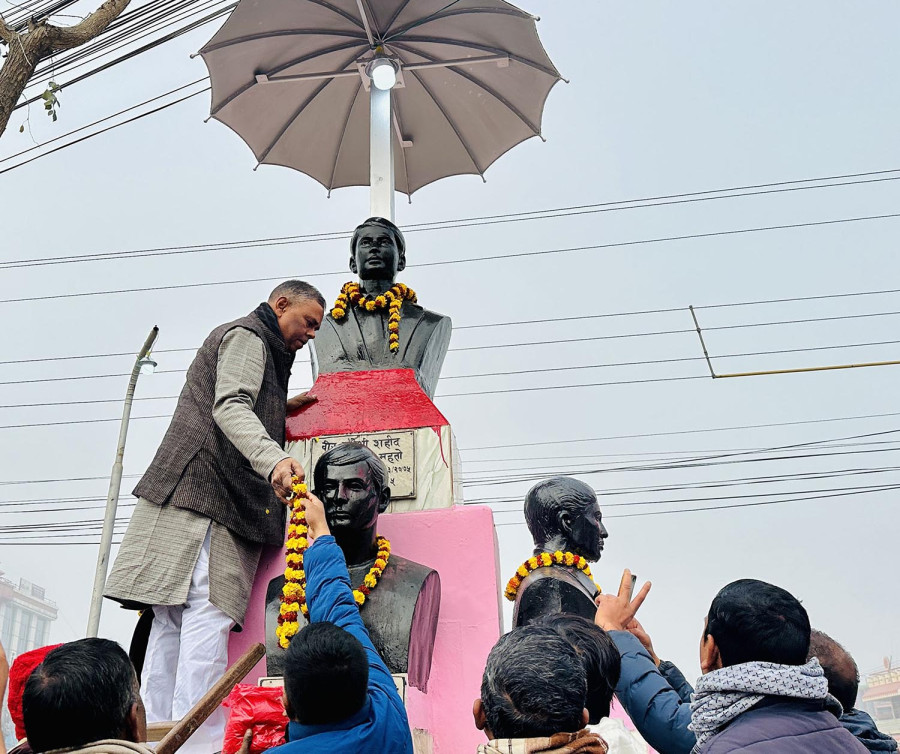Politics
Balidan Diwas events lay bare divisions amid Madheshi parties’ unity talks
Forces accused of forgetting federalism’s spirit in quest for power, failing the marginalised.
Purushottam Poudel
Leaders from Madhesh-based political parties on Saturday were busy attending various functions organised to mark the 18th memorial day of Ramesh Mahato, who Madhesh-centric forces remember on ‘Balidan Diwas’ (sacrifice day).
Chairman of Janata Samajbadi Party-Nepal (JSP-Nepal) Upendra Yadav, who led the Madhesh movement in 2007 and emerged as one of the most powerful Madheshi leaders, reached Siraha on Friday to mark the day.
Yadav garlanded Mahato’s bust amid a function in Lahan and addressed a gathering. Mahato was shot dead on January 19, 2007 at the same place. Since then, the Madheshi parties have honoured Ramesh Mahato as the first martyr of the Madhesh agitation that forced the government and other major political forces to commit to federalism.
After the success of the 2006 People’s Movement, the Interim Constitution was promulgated on January 15, 2007. But the Madheshi people were unhappy with the charter’s content.
The Madheshi Janadhikar Forum Nepal, a non-governmental organisation led by Upendra Yadav, launched a protest against the government, burning a copy of the interim charter at Maitighar in Kathmandu, on the day it was promulgated.
The government in turn described this act as sedition and arrested leaders and activists of the forum. In response, forum members in Madhesh declared a general strike, alleging that their leaders were subjected to police repression and torture in custody.
Maoist leader Ram Karki, who was travelling from the eastern part of Nepal, reached Lahan and tried to defy the strike called by the forum. A confrontation ensued, culminating in Ramesh Mahato being fatally shot on January 19. The incident ignited the 24-day Madhesh Movement and sowed the seeds of animosity between the Maoists and forum cadres.
“Whether the bullet was fired by a Maoist or Karki’s security personnel remains unclear,” Jitendra Sonal, a leader of the Loktantrik Samajbadi Party, said.
The agitation eventually ended with a 22-point agreement between the government and the forum. The government promised to include federalism, a policy of inclusion, and a proportional electoral system in the interim constitution.
Upendra Yadav later transformed the NGO into a political party—Madhesi Janadhikar Forum-Nepal, which emerged as a strong political force from the Constituent Assembly elections in 2008.
Riding this wave, other regional parties like the Sadbhawana Party and another offshoot Tarai-Madhesh Loktantrik Party also gained strength. But their influence waned after the second Constituent Assembly elections in 2013.
Weakened and divided, the Madheshi parties have recently considered forming a ‘loose alliance’ in a bid to regain lost ground. Last week, they even held an introductory meeting to discuss the proposal.
However, the ‘Sacrifice Day’ function could not bring them together, as each Madhesh-based party organised its own function to honour Mahato’s sacrifice.
Among the parties commemorating the day were JSP-Nepal of Upendra Yadav; Janamat Party of CK Raut; the Loktantrik Samjabadi Party led by Mahantha Thakur; and the Rastriya Mukti Kranti led by Rajendra Mahato.
If the Madhesh-based parties are really committed to addressing the issues of the Madeshi people, they should have organised a joint event to mark the historic day and send a positive message, say political analysts.
“This shows the hollowness of their promise to form a unified alliance,” said Chandra Kishore, a veteran journalist and Madhesh observer. “Each political party in Madhesh treats the day as a mere ritual and commemorates it in its own way.”
However, Laxman Lal Karna, a senior leader of the Loktantrik Samajbadi Party, is optimistic and says good intent alone does not immediately yield desired results. “The discussion to form a loose alliance has just begun, it will take time to materialise,” Karna said.
For Chandra Kishore, Madheshi parties’ commemoration of the Balidan Diwas is nothing more than “selling the martyrs”. He accuses them of trading the Madhesh Movement’s agenda for power.
This criticism is common, but Madhesh leaders rubbish such allegations as baseless and politically motivated.
“Some narrow-minded ruling class people are not happy with the opportunities gained by the Madheshi people, which is the reason they often make such baseless claims,” JSP-Nepal chair Yadav said. Terming the people from hill communities as the country’s ruling class, Yadav claims, “Madheshi people are still in a phase of struggle.”
But not all Madheshis buy his argument.
Even though the Madheshi people gained more rights after the movement, at least on paper, they are still being denied many of these rights, partly due to the failure of the Madhesh-centric leaders, says civil society leader Shiv Chandra Chaudhary.
“Leaders may make tall promises and blame others for their failure, but it was due to their inaction that Madheshi people are still unable to fully enjoy their rights,” Chaudhary, general secretary of a Sarlahi-based civil society group, said.
Bhogendra Jha, an analyst, claimed that Madheshi leaders themselves have failed to honour the spirit of federalism despite the system being the outcome of the struggles of the Madheshi people.
He said successive provincial governments in Madhesh including the current one led by Satish Kumar Singh of Janamat Party failed to work for the downtrodden communities.




 18.12°C Kathmandu
18.12°C Kathmandu















